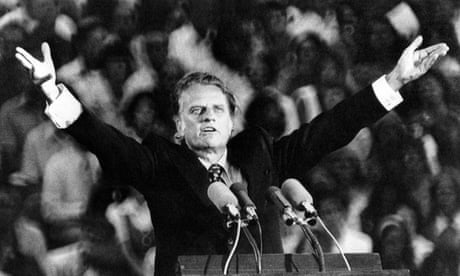Billy Graham was on the wrong side of history | Matthew Avery Sutton | Opinion | The Guardian
Billy Graham was on the wrong side of historyMatthew Avery Sutton
Racial tensions are rising, the earth is warming, and evangelicals are doing little to help. That may be Graham’s most significant, and saddest, legacy
Thu 22 Feb 2018 02.51 AEDTLast modified on Thu 22 Feb 2018 06.25 AEDT
View more sharing options
Shares
4,108
Comments640
Play Video
2:06 Five sermons from Billy Graham, the father of showman evangelicalism – video
When Billy Graham stands before the judgment seat of God, he may finally realize how badly he failed his country, and perhaps his God. On civil rights and the environmental crisis, the most important issues of his lifetime, he championed the wrong policies.
Graham was on the wrong side of history.
The world’s most famous evangelist let his apocalyptic anticipation of the coming kingdom of God blind him to the realities of living in this world.

Billy Graham, 'America's pastor' – a life in pictures
For Graham, the Bible had a clear message for Christians living in what he believed were humans’ last days on earth. Individuals alone can achieve salvation; governments cannot. Conversions change behaviors; federal policies do not.
These convictions shaped the evangelist’s views on civil rights.
In the late 1950s, Graham integrated his revivals and seemed to support the burgeoning civil rights movement. This is the Graham most Americans remember.
Advertisement
But as the movement grew, expanded and became increasingly confrontational, the evangelist’s position changed.
Once leaders like Martin Luther King Jr began practicing civil disobedience and asking for the federal government to guarantee African Americans’ rights, Graham’s support evaporated.
Within days of the publication of King’s famous 1963 Letter from a Birmingham Jail, Graham told reporters that the Baptist minister should “put the brakes on a little bit”.
He criticized civil rights activists for focusing on changing laws rather than hearts.
In 1971, Graham published The Jesus Generation, a book on the coming apocalypse. Looking for signs of Jesus’s second coming had become an obsession of Graham’s, as it was for millions of other evangelicals in the mid-20th century.
In the book, Graham praised the wisdom of young people who rejected the federal government as a tool for rectifying injustices.
Graham had the opportunity to lead fundamentalists into a new era, but he squandered it
“These young people don’t put much stock in the old slogans of the New Deal, the Fair Deal, the New Frontier and the Great Society,” he said. “They believe that utopia will arrive only when Jesus returns. Thus these young people are on sound Biblical ground.”
For six decades, Graham taught Americans that the federal government could not be an instrument of God to bring about justice, not on race matters and not on other significant issues. Although he believed in racial equality, his theology blinded him to what we now know was the best means for achieving that equality.
More recently, the evangelist denied the threat of global warming and rejected federal efforts to stymie it.
Advertisement
In a 1992 book focused on the signs that the world was nearing its end, the preacher suggested that if humankind were going to survive, businesses needed to reduce pollution and stop contributing to global warming.
In a revised 2010 version of the book, Graham eliminated the phrase “global warming” from the text altogether. Global warming no longer existed in the mind of Graham as a real threat.
He went on to assure readers that the earth would not “be saved through legislation”. The federal government, he indicated, had no business passing laws to protect the earth for future generations.
Graham’s positions on civil rights and the environment are not those of a rightwing crank, or of a paranoid anti-intellectual. Graham takes his Bible and his theology seriously. The political positions he has embraced derive from a careful and serious study of the scriptures.
Graham came of age during Franklin Roosevelt’s vast expansion of government power. But rather than join with social gospel advocates like Roosevelt’s aide Harry Hopkins in promoting the creation of a welfare state to serve the needy, the future evangelist was more influenced by apocalypse-obsessed, fundamentalist rabble rousers who rejected New Deal liberalism.
Play Video
1:04 Billy Graham preaches at Wembley Stadium in 1955
Graham, like most fundamentalists of his generation, determined that the New Deal state represented godless competition for the churches rather than a potential ally.

Sign up to the Green Light email to get the planet's most important stories
Read more
This is a message that appeared again and again in Graham’s many books on Jesus’s second coming. Only the return of Jesus would right social wrongs, he concluded.
The expansion of state power, in contrast, was a necessary precursor to the rise of the antichrist. The evangelist felt sure that as we approached the end of time, the world’s governments were going to take away Christians’ rights and liberties.
The New Deal, with its intrusive regulations, was the first step; Obamacare, with its contraception mandates, the most recent.
Yet Graham insisted that the inevitability of the second coming was no justification for indifference. “We must not feel that we are to sit back and do nothing to fight evil just because some day the four horsemen will come with full and final force upon the earth,” Graham wrote. Instead, he prodded evangelicals to elect people to office who shared his anti-statist worldview.
They did. White evangelicals have played an outsized role in recent political campaigns, supporting every Republican presidential candidate from Ronald Reagan to Donald Trump.
Graham had the opportunity to lead fundamentalists into a new era. He could have pushed them to take social reform seriously as a God-given mandate to save the world from environmental destruction. He could have tackled racism, America’s original sin, by championing the federal government’s aggressive civil rights policies.
But he squandered it. He could not overcome the speculative end-times schemes of his cohort of evangelicals, with their anti-government hostilities.
Graham had good intentions, as his work desegregating his crusades demonstrated. But when his influence really would have counted, when he could have effected real change, real social transformation, he was too locked into last-days fearmongering to recognize the potential of the state to do good. We are all paying the price.
A different kind of last days may soon be upon us. Racial tensions are rising, the earth is warming, and evangelicals are doing little to help. That may be Graham’s most significant, and saddest, legacy.
Matthew Avery Sutton is a Guggenheim Fellow and the author of American Apocalypse: A History of Modern Evangelicalism. He is the Edward R Meyer professor of history at Washington State University.
Sign up for the Guardian US opinion newsletter
No comments:
Post a Comment